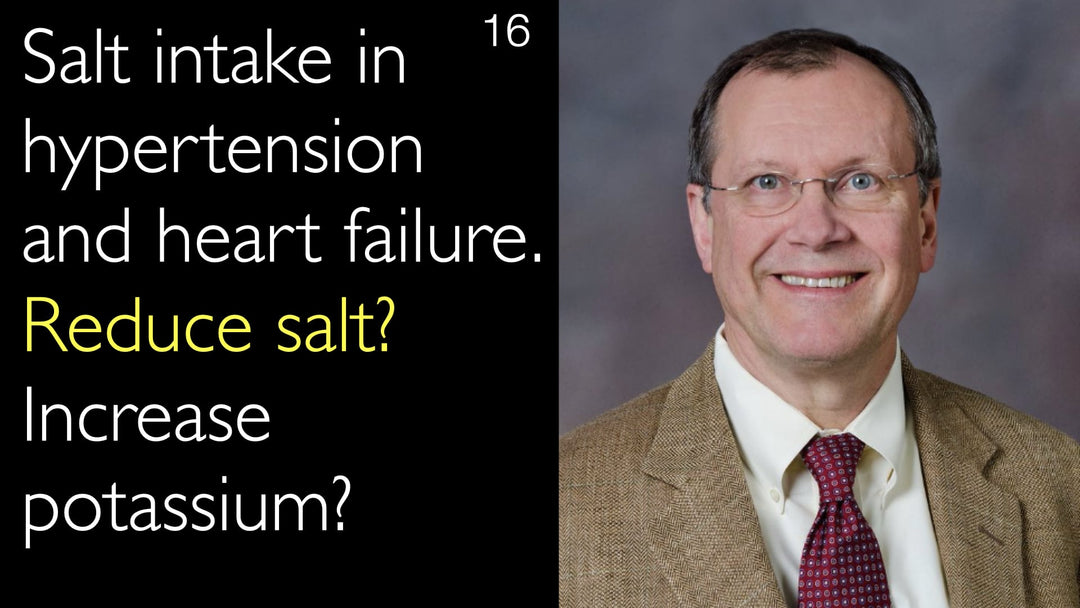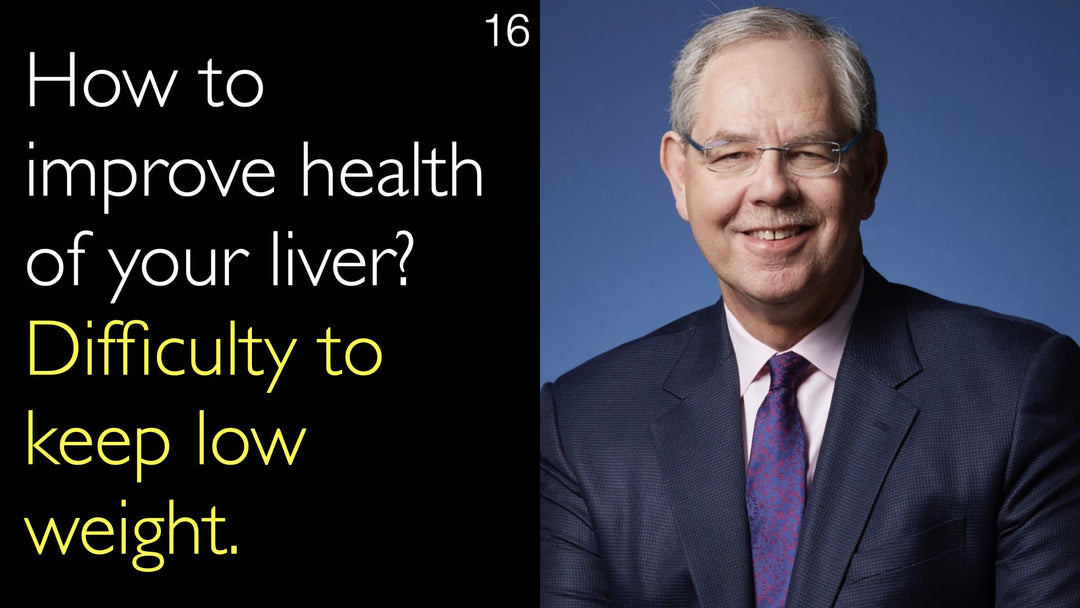Verenpainetaudin ja munuaissairauksien asiantuntijana tunnettu lääketieteen tohtori David Ellison valottaa ruokasuolan ja kaliumin monimutkaista roolia terveydessä. Hän pohtii, miksi pelkkä suolan vähentämisen suosittelu potilaille usein jää vaille vaikuttavuutta. Tohtori Ellison korostaa kaliumin saantia hedelmien ja vihannesten muodossa. Hän myös käsittelee kiistellyä aihetta suolan rajoituksesta sydämen vajaatoimintaa sairastavilla. Lopuksi tohtori Ellison painottaa natriumin saannissa tasapainoista ”Kultakutri”-periaatetta.
Ruokasuolan ja kaliumin tasapaino sydänterveyden ja verenpaineen kannalta
Siirry osioon
- Natrium-kalium-suhteen strategia
- Suola prosessoiduissa elintarvikkeissa ja ravintola-aterioissa
- Korkeakaliumisen ruokavalion hyödyt
- Suolarajoitus sydämen vajaatoiminnassa kiistanalaisena
- Kultakutri-lähestymistapa suolan saantiin
- Koko tekstitys
Natrium-kalium-suhteen strategia
Lääketieteen tohtori David Ellison esittää, että tehokkaampi ruokavalioon liittyvä strategia kuin pelkkä suolan vähentäminen on keskittyä natriumin ja kaliumin suhteeseen. Hän korostaa, että tärkeämpää on lisätä kaliumin saantia kuin pelkästään vähentää natriumin nautintoa. Ellisonin mukaan potilaille on helpompaa suositella terveellisten elintarvikkeiden lisäämistä ruokavalioon. Tämä lähestymistapa voi lievittää ruokasuolan aiheuttamia haitallisia vaikutuksia.
Suola prosessoiduissa elintarvikkeissa ja ravintola-aterioissa
Lääketieteen tohtori David Ellison pitää prosessoituja elintarvikkeita merkittävänä ruokasuolan lähteenä. Hän huomauttaa, että leipä ja muut prosessoidut tuotteet sisältävät runsaasti suolaa. Myös ravintola-ateriat lisäävät suolansaantia huomattavasti. Ellison uskoo, että elintarviketeollisuus pystyisi vähentämään tuotteidensa suolapitoisuutta tehokkaasti. Hän ehdottaa osan natriumin korvaamista kaliumpohjaisilla suolankorvikkeilla, mikä parantaisi myös makukokemusta.
Korkeakaliumisen ruokavalion hyödyt
Kaliumin saannin lisäämisellä on merkittäviä terveyshyötyjä kohonneen verenpaineen hoidossa. Tohtori Ellison suosittelee saavuttamaan tämän syömällä enemmän hedelmiä ja vihanneksia. Korkeakaliuminen ruokavalio auttaa tasapainottamaan natriumin kulutuksen vaikutuksia. Tämä lähestymistapa tukee sydän- ja verisuoniterveyttä sekä verenpaineen säätelyä. Tuoreet elintarvikkeet tarjoavat luonnostaan paremman kalium-natrium-suhteen kuin prosessoidut vaihtoehdot.
Suolarajoitus sydämen vajaatoiminnassa kiistanalaisena
Lääketieteen tohtori David Ellison käsittelee suolan ja sydämen vajaatoiminnan monimutkaista suhdetta. Vaikka diureetit tehoavat paremmin vähennetyn suolansaannin yhteydessä, viimeaikaiset tutkimustulokset osoittavat mahdollisia haittoja. Agressiivinen suolarajoitus akuutissa dekompensoituneessa sydämen vajaatoiminnassa saattaa olla jopa haitallista. Tämä lähestymistapa voi aktivoida reniini-angiotensiini-aldosteronijärjestelmän, mikä edistää sydämen vajaatoiminnan patogeneesiä ja verenpaineen nousua.
Kultakutri-lähestymistapa suolan saantiin
Lääketieteen tohtori David Ellison kannattaa tasapainoista "Kultakutri"-lähestymistapaa natriumin kulutukseen. Tämä tarkoittaa liiallisen suolan välttämistä ilman liian ankaraa rajoittamista. Erittäin vähäsuolaiset ruokavaliot voivat olla vastenmielisiä ja jopa vastatuottavia. Tavoitteena on kohtuullinen vähentäminen natriumin täydellisen poissulkemisen sijaan. Tämä käytännönläheinen lähestymistapa ottaa huomioon nykyaikaisten ruokailutottumusten haasteet ja asettaa samalla sydänterveyden etusijalle.
Koko tekstitys
Lääketieteen tohtori Anton Titov: Professori Ellison, mitkä ovat kaksi tai kolme yleisintä kysymystä, joita potilaat esittävät teille? Ja mitkä kysymykset potilaiden tulisi esittää, mutta joita he eivät ehkä kysy niin usein?
Lääketieteen tohtori David Ellison: Potilaat ovat esittäneet paljon hyviä kysymyksiä. Epäilemättä yleisin koskee ruokasuolan vähentämistä. Kuten alussa mainitsin, suolasta on tehty paljon tutkimusta ja siihen on kiinnitetty paljon huomiota. Mutta lääketieteellisessä kirjallisuudessa usein unohdetaan, että suola parantaa ruoan nautittavuutta ja makua.
Asun Portlandissa, Oregonissa, jossa on monia erinomaisia ravintoloita. Kun käyn missä tahansa näistä ravintoloista, huomaan, että ruoan suolapitoisuus on erittäin korkea. Portland valittiin äskettäin maan parhaaksi ruokakaupungiksi. Se johtuu luultavasti osittain siitä, että ruokaan lisätään paljon suolaa.
On helppoa sanoa, että sinun pitäisi vain lakata syömästä suolaa ja noudattaa suosituksia. Mutta käytännössä se ei ole niin helppoa. Vastaukseni on kaksiosainen.
Ensinnäkin, kuten alussa sanoin, liiallisen suolan välttäminen on hyvä asia, ja sinun tulisi yrittää tehdä niin. Mutta yhtä tärkeää on pyrkiä lisäämään ruokavaliossasi kaliumin määrää tai parantamaan kaliumin ja natriumin suhdetta. Mielestäni on helpompaa kehottaa ihmisiä syömään enemmän jotain kuin vähemmän jotain.
Enemmän hedelmiä ja vihanneksia syöminen, enemmän korkeakaliumisia elintarvikkeita syöminen on jotain, mitä suosittelen aina potilaille. Se voi lievittää osaa suolan aiheuttamista haitoista.
Toinen kommenttini potilaille on, että suurin osa tästä ei ole potilaan hallinnassa. Mielestäni on vaikeaa elää nykymaailmassa ilman, että kohtaa paljon suolaa ravintoloissa tai ulkona syödessään. Mutta uskon, että meidän tulisi kannustaa teollisuutta vähentämään suolan määrää.
Tässä maassa, toisin kuin Kiinassa, suurin osa elintarvikkeissamme olevasta suolasta on prosessoiduissa elintarvikkeissa. Leivässä on esimerkiksi valtavasti suolaa. Kaikki prosessoidut elintarvikkeet ovat erittäin suolaisia. Uskon, että teollisuus voisi vähentää suolan määrää tai parantaa kaliumin ja suolan suhdetta.
Se olisi hyödyllistä meille kaikille. Se ei pakottaisi ihmisiä tekemään vaikeita valintoja ravintolassa tai kotona syödessään. Ilmeisesti tuoreiden elintarvikkeiden syöminen on parempaa, jos siihen pystyy.
Mutta mielestäni olisi hienoa, jos voisimme jonkin verran vähentää elintarvikkeiden suolapitoisuutta. Uskon, että se olisi maukasta, ehkä korvaamalla osa siitä kaliumilla, koska se on suolankorvike ja useimmat pitävät sen mausta melko hyvää. Joten mielestäni se on ykköskysymys.
Kakkoskysymys liittyy läheisesti tähän. Se koskee yleisterveyttä. Kakkoskysymys on: "Tohtori, minulla on sydämen vajaatoiminta, pitääkö minun vähentää nautitsemaani suolamäärää?" Tämä on jälleen kerran kiistanalainen aihe.
Varomme aina, että diureetit ovat tehokkaimpia, jos ruokavaliossa vähennetään suolansaantia. Mielestäni se on melko selvää vakaassa tilassa olevilla potilailla. Mutta viime aikoina on noussut esiin erittäin provokatiivista tietoa, joka viittaa siihen, että akuuteissa dekompensoituneen sydämen vajaatoiminnan potilailla suolansaannin aggressiivinen rajoittaminen sairaalassa ei näytä olevan hyödyllistä, ja se voi jopa olla haitallista.
Mahdollinen ongelma ruokavalion suolansaannon tiukan rajoittamisen kanssa on, että se aktivoi reniini-angiotensiini-aldosteronijärjestelmän. Tiedämme, että reniinijärjestelmällä on erittäin tärkeä rooli sydämen vajaatoiminnan patogeneesissä ja luultavasti myös verenpaineen nousussa.
Jos ruokavalion suolansaantia rajoittaa liikaa, se todennäköisesti aktivoi reniinijärjestelmää enemmän, mikä ei välttämättä ole hyödyllistä näille potilaille. Joten kerron useimmissa tilanteissa kaikille potilaille, että uskon Kultakutri-vaikutukseen.
Mielestäni liiallisen suolansaannon vähentäminen on tärkeää. Mutta uskon myös, että suolansaantia voi mahdollisesti vähentää liikaa. Erityisesti ottaen huomioon, että erittäin vähäsuolaiset elintarvikkeet eivät useinkaan ole miellyttäviä tavalliselle amerikkalaiselle.
On tärkeämpää vähentää suolaa jonkin verran kuin yrittää vähentää sitä nollaan ja sitten korvata se kaliumilla, jos mahdollista.







